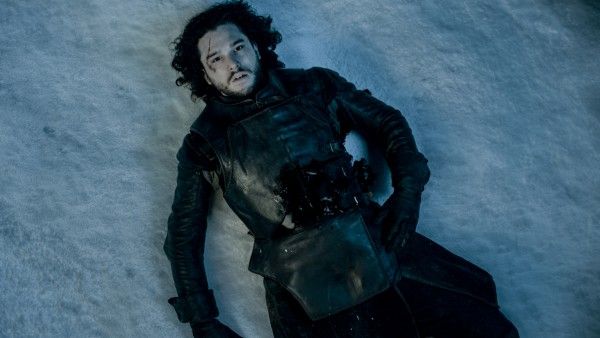Warning: This post is dark and full of spoilers from Sunday’s episode of Game of Thrones, plus some from the recent season of The Walking Dead.
We all knew it was coming. We knew it was coming since the Season 5 finale, but the cast and producers of Game of Thrones kept skirting the issue. Some dangled the carrot in front of the fans by claiming “maybe he is, maybe he isn’t,” while others definitively stated Jon Snow was killed at the hands of his Night’s Watch brethren. After months of this brouhaha, we finally have an answer: Jon Snow crossed back over into the land of the living.
This wasn’t the first time a shocking character death tried to became more shocking through a revival, but the mystery of Jon maintained the same course as the mystery of Glenn. Steve Yeun’s character on The Walking Dead was at the center of a critical and fan backlash when it appeared a horde of walkers gutted him in typical gory fashion. The Hollywood Reporter’s Tim Goodman said, “I know there's a theory that it's not his innards coming out and that he's under Nicholas and will survive. But honestly, that is and would be total bullshit.”
The show lost a bit of credibility, not just because it seemed like silly storytelling, but because of the manipulation of the fans by the hands of the producers. There was even a point where David Alpert said, “the Glenn that we knew…I think is dead.” Yet there were various pieces of evidence and theories that seemed to point to his lively return. Then, in November, after everyone realized they were duped and vented our clear frustrations to the show, the Twitter account for The Walking Dead tweeted some shade at Game of Thrones regarding the Jon-centric poster for Season 6: “And you guys thought WE were torturing our fans…”
These scenarios are essentially the same — a character met their death and the issue has been drawn out via speculation and at times torturous teases from the powers that be. So why aren’t fans as up in arms with Game of Thrones as they were with The Walking Dead? The answer seems to lie in another question: Where is the line that separates suspense from exploitive engineering?
At one point the question “Is Jon Snow dead?” became a game among the media. Everyone from Maisie Williams (who doesn’t share scenes with Kit Harington) to Rose Leslie (whose character was killed off and, at the time, who still hadn’t made a public appearance with Harington as a couple) had an answer. None of them could honestly be blamed for manipulating the situation because they probably, genuinely didn’t know what the heck was going on with this show. Then we have Harington himself, who just this weekend released a statement for straight up lying to fans about his death. We all know how that has worked out for actors in the past — Benedict Cumberbatch’s whole “I’m not a crook” with Star Trek Into Darkness was cute until it wasn’t, and I know I was aggravated when Christoph Waltz told me to my face during a press junket that he wasn’t Blofeld in Spectre.
But Harington, technically, didn’t lie — and neither did the producers. Jon was in fact dead. The question that should’ve been asked was, “Will he be resurrected?” something that, too, has precedence because of the George R.R. Martin’s books. That’s where Game of Thrones separated itself from The Walking Dead — wisely navigated semantics — and yet both situations are still problematic.
For Thrones, it was obviously clear that Jon would live again. The whole R + L = J theory (if you don’t know what that is, I won’t spoil it for you) is practically no longer a theory based on how many true believers stand behind it, plus Martin stated in the past that there’s at least one theory out there that figured out his central mystery. (Spoiler alert: he probably wasn’t talking about the whole Ramsay-is-a-vampire thing.) Elsewhere, there was no other purpose for Melisandre’s presence at Castle Black other than to move the plot along, and moping around while she ponders her past mistakes doesn’t do much for the overarching story unless something comes of it.
At this point, it could’ve been even more beneficial for Game of Thrones to leave Jon a cold corpse on a slab. The showrunners are attempting to give the show new life by diverting further from the source material, which has left book readers in a perpetual state of “will or won’t this happen?” I was visibly shocked when Jon drew breath, but only because I wanted to feel that electricity again. For a show that — like The Walking Dead — prides itself on its shockers, this wasn’t all that shocking. A WTF moment only works when there’s something unexpected. Perhaps the most shocking aspect was that the resurrection came in Episode 2 and not drawn out further.
For as much as I want to love Game of Thrones, and I do, it’s been stuck in muck. Many things have been written about the problem with Dorne and its glaring plot hole from the Season 6 premiere, while, generally speaking, nothing much happened in “Home” other than to set up the next episode. Given his role in some of the most heart-pounding moments of Seasons 4 and 5, perhaps the return of Jon will breath new life into the drama.




